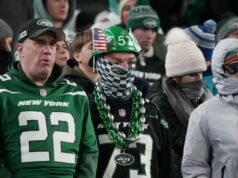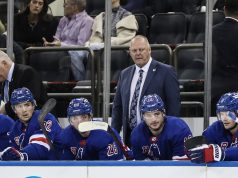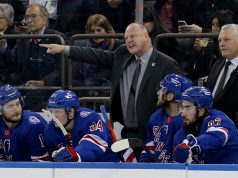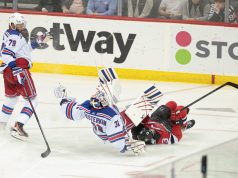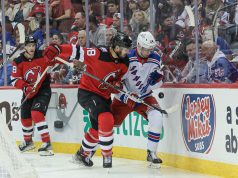Chris Kreider
Kreider is a curious case.
He played terribly for 75% of the season, yet he basically matched his production from last season with 21 goals and 22 assists.
But Kredier was expected to take “the next step” this season, yet he looked completely lost for a good portion of the season.
That hard-nosed, unrelenting player did show up towards the end of the season, but you could argue that it was a day late and a dollar short.
If Kreider was even somewhat consistent, he could have easily scored 30-35 goals this season.
If Kreider is going to be a part of Jeff Gorton’s plan moving forward, Kreider will need to be much more consistent next season.
Grade: C
Derek Stepan
Stepan is perhaps the most consistent player on the Rangers roster.
You can usually predict that Stepan will give you his 50ish points and call it a day. This season he tallied 22 goals and 31 assists.
The issue with Stepan is that he is a first line center who was paid 6.5M this season and while he is certainly adds positive chemistry to the team, he doesn’t consistently perform like a first line center.
Similar to Brassard, Stepan often finds himself lost in the defensive zone. While it is certainly to a lesser extent, he is usually guilty of blown coverage and bad defensive positioning.
In the end, Stepan is a second line center who is paid and treated like a first liner.
Grade: B
Mats Zuccarello
Of all the forwards, Zuuuuuc was certainly the hardest to assign a grade.
He notched a career-high 26 goals and 35 assists after returning from a life-threatening head injury.
He is perhaps the most beloved player on the team and shows up for almost every game.
And that is where Zuccarello falters here. He showed up for almost every game this season.
Zuccarello’s production in big games slowed and the season came to a close. As effective as the Brassard/Zuccarello connection was in years prior, it was a defensive liability this year.
Vigneault had no choice but to split the two up as a result.
It’s hard to separate the adversity that Zuc overcame from his performance, and while he will be an essential part of the Rangers’ plan moving forward, he just cannot continue to be ineffective defensively.


